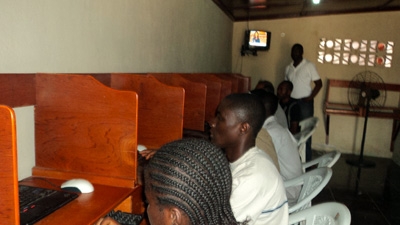MONROVIA, April 17, 2012 – The installation of fiber-optic cables to bring high-speed, affordable internet access to Liberia continues, and is expected to be available later this year.
Daniel Brewer, project manager with the Cable Consortium of Liberia, three engineers deployed from Alcatel LUCENT in France are working on the installation of the equipment.
“This installation work is expected to be completed on April 18, 2012 and fully tested and ready to go live by June 15, 2012,” Brewer said. “We have set a tentative date of November 5, 2012 to commission and allow the system to go live because we have to wait for the other 19 stations along the Atlantic Coast to be ready before we all go live together.”
The landing of the Africa Coast to Europe (ACE) submarine fiber-optic cable of the West Africa Regional Communications Infrastructure Program (WARCIP) in Monrovia in early November 2011 has already had an impact on ordinary Liberians. This World Bank supported project is to promote greater regional economic and infrastructural integration.
It was on a sunny day when the vessel carrying the fiber-optic cable was spotted off the coast of Monrovia, dropping cable on Liberia’s coastal belt. The landing brought happiness to many Liberians, including school children who went on the beach to witness this historic development. It was like a dream come true to see the start of the process of connecting Liberia to other countries in the region.
Liberia suffered great infrastructural destruction during long years of conflict and the ACE cable will bring great relief to the country, which is aggressively pursuing its economic and development agenda. Once connected, it will increase Liberia’s geographical reach of broadband communications networks nationally, regionally and globally. It will also reduce the cost of communications services within Liberia, and between the country and the rest of the world. This will bring a huge relief to Liberians and its partners because it is costly to use internet services, compounded by the snail pace at which it operates.
Connecting Liberia to this network will accelerate economic growth and development because the Liberian government, students, businesses, organizations and other partners need fast speed and low-cost communications services to enhance their work and learning. Liberians also need these services to use for social networking.
“The project proposes an integrated approach to improve connectivity in Liberia by providing opportunity to Liberia to have competitive access to the ACE submarine cable and creating an enabling environment and institutional strengthening to support private sector participation in Information and Communication Technology (ICT) infrastructure,” said Coleen Littlejohn, World Bank senior operations officer in the Liberia Country Office.
Addressing the landing of the ACE cable in Monrovia, Littlejohn said under the project, the Bank is providing US$25.6m International Development Association (IDA) financing. “This IDA lending is to be repaid in 40 years with a ten-year grace period, and zero interest rate,” she said.
The Liberia Telecommunications Authority (LTA) has described this project as an unprecedented development in the telecommunications sector.
“The US$25m public private initiative with the public owning 60 percent and three communications businesses; Libtelo, Lone Star-MTN and Cellcom will own 20, 10 and 10 percent respectively,”
said Angelique Weeks, chairperson of the Board of Commissioners of the LTA. “The Government of Liberia intends to divest itself of its shareholding by providing connectively to public universities, hospitals and other institutions to permit development of E-medicine, E-business and other developmental initiatives in conformity with the ICT Policy and the Project’s development objectives.”
Caesar Morris, owner and operator of a local internet café shop on 11th Street, Sinkor, Monrovia, expressed happiness for this project. Because of the slow speed of the internet, students must sometimes stay overnight to complete their assignments. Also, due to the high population of Monrovia, Morris is struggling to cope with customers’ demand. Monrovia is home to about half of Liberia’s 3.4 million people.
The high cost of electricity further compounds the problem. Currently Morris pays US$769.00 for a monthly subscription for internet services, which is very high. But despite the challenges, Morris said that the landing of the ACE cable will improve the industry.
“This fast and less expensive internet system will boost our work in a significant way; it will enhance learning, especially for high school and university students, who greatly depend on our services on a daily basis,” he said. “It will have a trickle-down effect on end-users.”
A senior student of the Catholic Church-run Stella Maris Polytechnic School, T. Jeremy Yattoh, says he is impressed about the landing of the fiber optic cable in Liberia.
“It will be very good for Liberia; it will make communication easier and reliable; and it will allow us to maximize use of the internet for educational services such as research and online schooling, including other services like live video screening,” said Yattoh, who is working toward a bachelor’s degree in electronic engineering.
Liberia’s socio-economic development has been constrained by poor telecommunications infrastructure. Access to bandwidth in Liberia is among the lowest in the region with internet penetration as low as 0.5 percent. Because Liberia is not connected to an international fiber optic network, the country relies on very expensive satellite connectivity for all its telecommunications needs. The cost of satellite connectivity in Liberia is two-to-three times that of the regional average.

